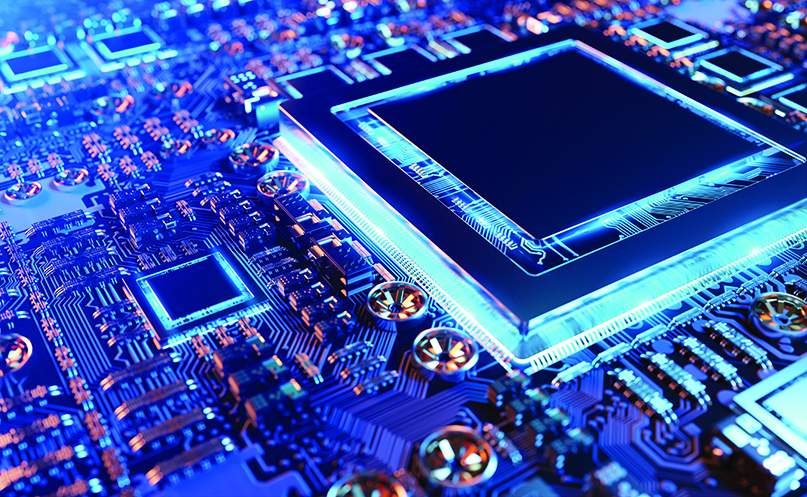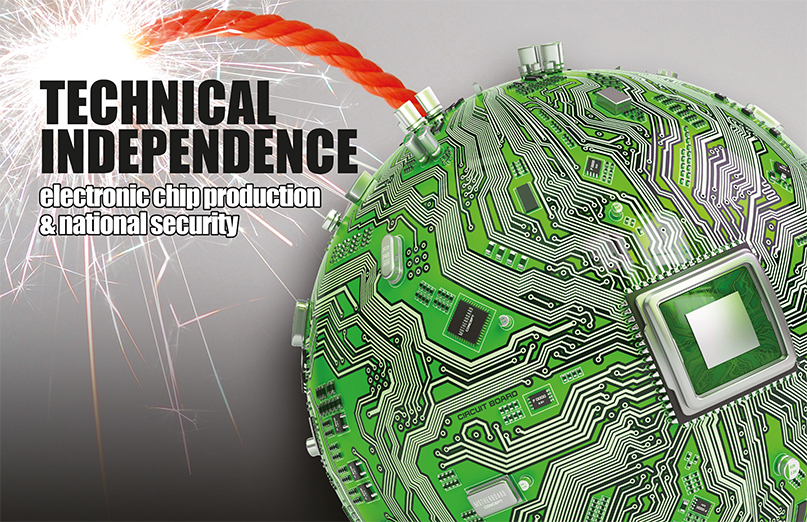In 2021, the microchip shortage crisis left a big global impact on economic conditions, in addition to the tendency of United States to use economic sanctions against some countries, particularly Chinese tech companies, such as Huawei, or Russia, because of the recent Ukrainian crisis, that have highlighted the importance of expanding the Countries capabilities to produce these chips.
Countries now consider it a necessity for maintaining their national security, especially given the various civilian and military applications of these chips. Due to the decline in the production of raw materials owing to the Corona pandemic and the following setback in demand, there has been a shortage of semiconductors, which prompted many companies in this field to suspend their production lines.
Geopolitical factors also played a role in this crisis, especially when the Trump administration began to place restrictions on the sale of semiconductors to ZTE, Huawei, and other Chinese companies. In response to the restrictions, these companies began stockpiling essential chips for 5G smartphones and other products.
Meanwhile, the federal government blacklisted the China International Semiconductor Industry Corporation, effectively cutting off US companies from chips made by the company.
This crisis highlighted the increasing dependence on Asia particularly Taiwan, in the production of these chips, which prompted various countries such as United States, European Union, and China to try developing strategies for manufacturing these important chips, given their civilian and military applications.
Although Taiwan Semiconductor Manufacturing Corporation, the world’s largest semiconductor manufacturer, has raised its capital spending budget for 2021 to $28 billion, seeing returns on that investment takes a long time because financing and building a new semiconductor plant takes at least five years.
Importance of chips in the military industries
Although electronic components used in advanced military systems utilize similar chips to those used in consumer electronics, there are special requirements for military industries, including semiconductors with certain properties.
While commercial chip production is largely driven by a combination of cost and large-scale production feasibility, the defense industry’s demand for chips is focused primarily on performance. Military chips must be more durable, reliable, have a higher heat tolerance, and in some cases, radiation tolerance as well.
Many military-grade chips contain composite semiconductors, which have superior electronic properties, such as higher electron mobility and a direct bandgap, compared to silicon semiconductors.
Military and Aerospace applications such as signal intelligence, military communications, space capabilities, radars, jamming devices, and many more, use chips based on Gallium arsenide (GaAs) and Gallium nitride (GaN).
For its part, Taiwan plays an essential role in global semiconductor manufacturing. Taiwan’s WIN Semiconductors holds 9.1 percent of the total market share of Gallium arsenide devices, making it the third-largest manufacturer in the world after the US companies Skyworks and Qorvo, owning 30.6% and 28.6% of the market, respectively.
However, in terms of revenue from the pure Gallium arsenide foundry, Win Semiconductor has the largest share with 79.2%, followed by Tainan-based AWSC (8.6%), California-based GCS (4.2%), and Hsinchu-based Wavetek (3.4%).
More notably, the three largest Taiwanese companies together own more than 90% of the Gallium arsenide foundry global market.

Close-up view of a modern GPU card with circuit and colorful lights and details 3D rendering
Although the United States has been able to manufacture defense-related semiconductors at home, via companies such as Raytheon, Northrop Grumman, and other contractors, other countries haven’t.
Given that advanced commercial chips still play an essential role in some weapon systems, such as radars, as well as computer processing units (CPUs), graphics processing units (GPUs), and memory chips, many countries had to rely on Taiwan along with countries other than the U.S.
However, Taiwan isn’t the only player in the semiconductor supply chain, the United States still holds some leading roles, especially in chip design and electronic software tools. The Dutch company ASML Holding NV monopolizes the market of manufacturing equipment needed to produce the best chips, while Japan is considered the major supplier of equipment, chemicals, and chips. Faster chips give a strategic advantage over an opponent in defense and military applications, To this end, semiconductors are used in a variety of applications including communications, command and control systems, targeting systems, radar systems, high-precision war games, and autonomous systems such as drones.
The importance of the national security of semiconductor chips extends far beyond direct national security applications to the field of state economic security, and geopolitically important technologies, especially those related to critical infrastructure and services.
In the case of Artificial intelligence, semiconductors are considered a key driver for the development, spread, and functionality of current and future machine learning applications.
Artificial Intelligence is based on three interconnected pillars: data, algorithms, and computing power, and the latter is what brings data and algorithms to life. Thus, with the more complex artificial intelligence systems become, the higher computing power required.
Therefore, Artificial Intelligence drives the development of better electronic chips, constantly spurring investments in its research and development.
Threat to national security
Electronic chips pose an increasing threat to the national security of countries, not just from a military and security perspective, but also threatens the countries’ economies, because of the role these chips play in many defense industries and the possibility of their employment as tools for sanctions by other countries, which directly threaten the economic prosperity and security.
Examples of Electronic chips’ threat to national security:
1- The threat to the Chinese economy: The administration of former US President Donald Trump took advantage of the weakness of some Chinese companies, preventing them from accessing advanced technology, depriving “Huawei Technologies” from acquiring semiconductors from “Taiwan Semiconductor” in 2018, and other companies.
This has hindered the progress of the largest tech company in China, leaving the company to suffer the largest quarterly decline in its sales, by 38% annually to 168.2 billion yuan (26 billion dollars), in the second quarter of 2021, according to Bloomberg.
2- Attempt to threaten Russian military industries: Due to its military attack on Ukraine, because of the United States’ refusal to ensure that Ukraine would not join NATO, as well as Kyiv’s threat to Moscow to acquire nuclear weapons, the United States sought to impose sanctions on Russia and attempted to prevent Moscow from buying some high-tech products, in an effort to weaken Russia’s military industries.
For its part, the world’s largest chipmaker, Taiwan Semiconductor Manufacturing Company, which controls more than half of the global market for custom-made chips, has pledged to fully comply with US export sanctions.
3- Threat to the global industry: The repercussions of the shortage of electronic chips have included car sales decline around the world in 2021. Given that chips are part of every modern car, global car production suffers from a shortage of chips supply, forcing many major companies to stop or reduce the number of working hours in many of their factories.
The South Korean-based carmaker, Hyundai Motor Group, announced that its sales in the United States declined last month by a rate of 13% annually, due to the continuing shortage of electronic chips used in the auto industry .Other companies have seen disruptions to their production line, such as Germany-based “Volkswagen”, American-based “Ford Motor”, and Japan-based “Toyota Motor”.
Apple’s stock fell by 1.45 % in October 2021, when the company announced its intention to reduce the production of phones by about 10 million units after it was scheduled to produce 90 million units in the last quarter of 2021, as well as reducing the production of other company devices such as Mac and iPad.

NUREMBERG / GERMANY – APRIL 7, 2019: Hyundai logo on a Hyundai car at a car dealer. The Hyundai Motor Company is a South Korean multinational automotive manufacturer headquartered in Seoul.
Countermeasures
Most countries have adopted policies aimed at reducing dependence on imported electronic chips. In this context, the following countermeasures were the most prominent:
1- US investments in chips: U.S current president Joe Biden’s administration has proposed a $2 trillion investments package in US infrastructure, $300 billion in which to be used to boost the manufacturing sector in the United States, including $50 billion for the production and research of electronic chips.
2- Similar European plans: The European Union aims to strengthen its technical sovereignty, particularly in the field of manufacturing electronic chips, through an alliance between both the public and private sectors, as well as directing initial investments of up to 30 billion euros ($36 billion), to raise Europe’s share of the global chip market from the current 10% to 20%, without setting a target timetable.
The block has also succeeded to some extent in encouraging Taiwan to increase investment in its 27 countries, as the Hsinchu-based Global Wafer’ offer strengthened Germany Siltronic AG value to €4.4 billion, an acquisition that would create a silicon chip manufacturer with the highest revenue in the world .
Semiconductor companies received more than $50 billion in government support between 2014 and 2018, according to the estimates of the Organization for Economic Co-operation and Development.
This was due to the fact that different countries have begun prioritizing chip production, offering incentives to attract semiconductor manufacturers, including grants, equity investments, infrastructure support, and tax credits..
3- Searching for alternatives: The United States use of electronic chip sanctions as a weapon pushes the affected countries, such as China, to enhance their capabilities in the field of manufacturing these chips; it can also prompt these countries under sanctions to cooperate with other countries that are not subject to American pressure, such as Russia.
Analysts speculated that some Chinese companies, especially those targeted by US sanctions, such as Huawei, might help Russia circumvent US export controls, becoming in the process a safer alternative to Russia , especially since there are indications that Western countries will no longer dominate advanced modern technology.
Other countries have managed to challenge and have exceeded the western countries in some areas, such as the success of Russia and China in developing hypersonic missiles, a type of missiles that no Western country has been able to develop yet.
Conclusion: It is now obvious that the crises of electronic chip production chains, and the endeavors of some major powers, such as the United States, to employ their global influence on some of the leading companies in this field, especially Taiwanese companies, to push them to cut production from Chinese or Russian companies, will eventually push countries to attempt to boost technical independence in chips’ production.
Given that the dependence of many civil and military industries on those chips, means that these electronic chips can be used to threaten the national security of these countries, both economically and militarily.
« By: Dr.Shadi Abdel Wahab (military researcher and strategist)













